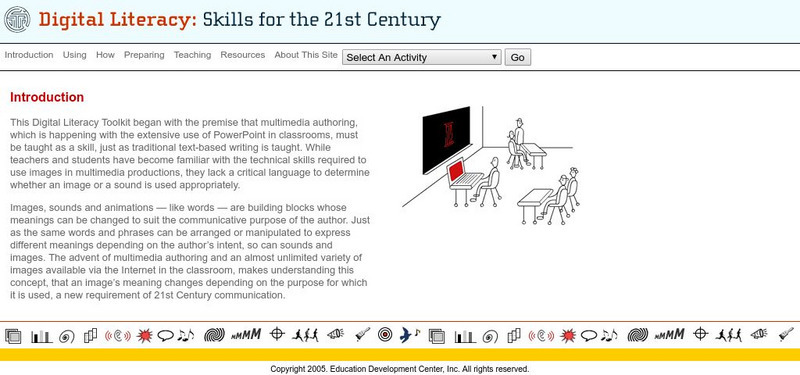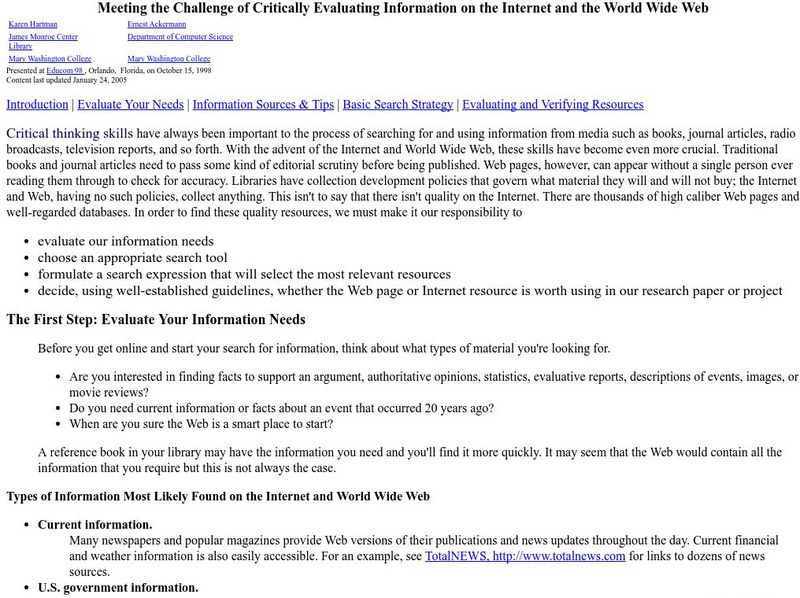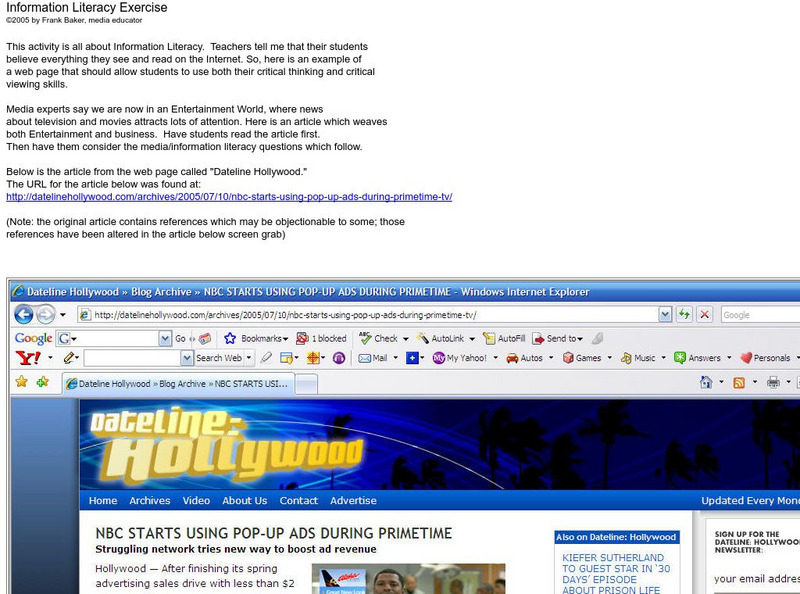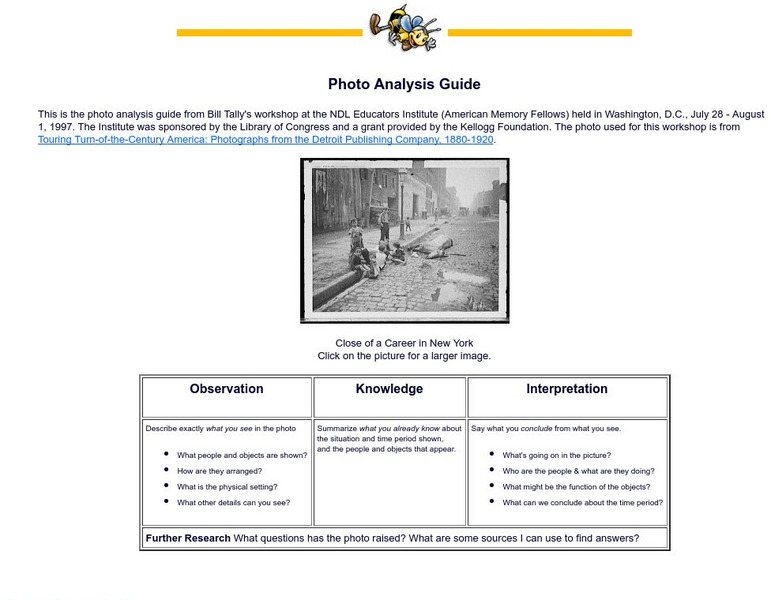Other
Media Education Foundation: Deconstructing an Advertisement [Pdf]
Outline of the steps involved and the questions to ask in critically assessing a print advertisement.
TED Talks
Ted: Ted Ed: How False News Can Spread
In previous decades, most news with global reach came from several major newspapers and networks with the resources to gather information directly. The speed with which information spreads now, however, has created the ideal conditions...
PBS
Pbs Learning Media: Missing From Texts: Critical Changemakers
Here are some changemakers from around the country who do amazing work and deserve to be celebrated for their contributions, the pathways they have set before and ahead of themselves, and the inspiration they provide to the countless...
Massachusetts Institute of Technology
Mit: The Re:constructions Project
re:constructions is an online resource and study guide, designed to spark discussions and reflections about the media's role in covering the events of 11 September 2001 and their aftermath. Through discussions with students, staff, and...
Education Development Center
Digital Literacy: Skills for the 21st Century
This tool kit makes the case that critical and creative use of multimedia authoring tools such as PowerPoint must be taught to students. Lessons, background material, assessment and interactive activities are included.
Other
Webliminal: Critically Evaluating Information on the Internet
This site gives excellent information on why it's important to evaluate the content of everything you find in cyberspace, and also tells you how to do so. It also contains information about using search engines effectively and how to...
PBS
Pbs Learning Media: Pov Collection
POV (a cinema term for "point of view") is television's longest-running showcase for independent non-fiction films. POV premieres 14-16 of the best, boldest and most innovative programs every year on PBS. Since 1988, POV has presented...
PBS
Pbs Learning Media: Retro Report Collection
Retro Report is a nonprofit news organization that connects the past to our present. Their short videos provide both historical context and new perspectives. You can use the videos and lesson plans to inspire critical thinking and...
PBS
Pbs Learning Media: Whose Streets?: Lesson Plan Clips
This instructional activity provides a framework for critical analysis of current and historic race relations in America through the lens of the 2014 shooting of Michael Brown, Jr., a young unarmed black man, by white police officer...
Other
Frank Baker: Information Literacy Exercise
Using an article from Dateline Hollywood, this lesson explores a media message and examines its content.
Other
Critical Issue: Using Technology to Improve Student Achievement [Pdf]
NCREL provides a detailed report on the use of technology for student improvement. Click on Action Options and scroll down the area designated for teachers to view NCREL ideas on classroom implementation.
North Central Regional Educational Laboratory
Ncrel: Critical Issue: Using Technology to Improve Student Achievement
NCREL provides a detailed report on the use of technology for student improvement. Click on Action Options and scroll down the area designated for teachers to view NCREL ideas on classroom implementation.
PBS
Pbs Learning Media: The Healthy Kids Project
The Healthy Kids Project uses song, movement, and animation in ten engaging lessons that support healthy choices and attitudes--teaching not only successful actions, but also successful strategies. It's a turnkey kit for teachers to...
PBS
Pbs Learning Media: Being a Leader
Help your students think critically about the dynamic and changing nature of what it means to be a leader. Below you'll find resources that will assist and encourage your students to explore their value systems, promote positive...
Tom Richey
Genesee Community College: Chapter 2: Perspectives on Mass Communication
A 30-slide presentation on three different perspectives for understanding mass communication. These include the functions of mass media, the critical/cultural perspective, and the research-based empirical approach. It looks at the many...
Other
Association for Educational Communications & Technology: Learning From Tv
Research regarding what is internalized and learned from television and the responsibility parents and educators have helping students to decipher between reality and fabrication. Media literacy, or how a viewer perceives what they are...
Georgia Department of Education
Ga Virtual Learning: Contemporary Issues: The Effects of Tv
This lesson focuses on the effects of TV and media and the importance of researching both sides of an issue. It features links to the articles Buzzle: "Negative Effects of Television" and Slate: "The Benefits of Bozo." It also asks...
Stanford University
Stanford U.: Evaluating Information: The Cornerstone of Civic Online Reasoning
This report from the Stanford History Education Group describes the conclusions of their work in field testing a set of assessments of civic online reasoning by young people from the middle school to the college level. Middle school...
TeachEngineering
Teach Engineering: The Big Mo
Momentum is not only a physical principle; it is a psychological phenomenon. Students learn how the "Big Mo" of the bandwagon effect contributes to the development of fads and manias, and how modern technology and mass media accelerate...
Annenberg Foundation
Annenberg Learner: Artifacts and Fiction: Workshop in American Literature
This workshop, which is divided into eight segments, teaches how to use primary source artifacts from a variety of genres to support the teaching and learning of specific pieces of literature. The genres include visual arts, political...
PBS
Pbs Learning Media: Einstein: How Smart Was He?
This essay from the NOVA Web site explores the impact Einstein made on physics and most everything we know about the cosmos.
AdLit
Ad lit.org: Cross Disciplinary Proficiencies: American Diploma Project Benchmarks
Students must graduate from high school with not only a firm foundation in mathematics and English, but also with the ability to approach with confidence new and unfamiliar tasks and challenges in college, the workplace and life....
Rock and Roll Hall of Fame
Rock & Roll Hall of Fame: Sti Lesson 28 the Electric Hearth
As educators, the goal of developing students into discerning, critical viewers may enable them to negotiate with more confidence through the treacherous waters of today's multimedia. Studying the various viewpoints as expressed in...
Cyberbee
Cyberbee: Photo Analysis Guide
This site is a guide to help students analyze visual media. Further research questions included.
![Media Education Foundation: Deconstructing an Advertisement [Pdf] Activity Media Education Foundation: Deconstructing an Advertisement [Pdf] Activity](https://static.lp.lexp.cloud/images/attachment_defaults/resource/large/FPO-knovation.png)









